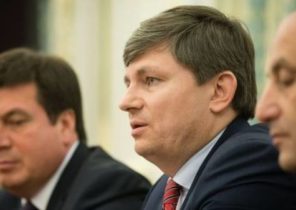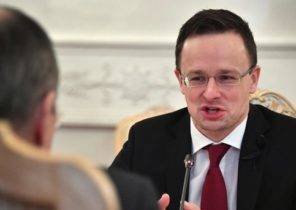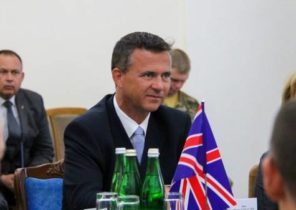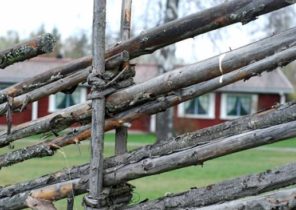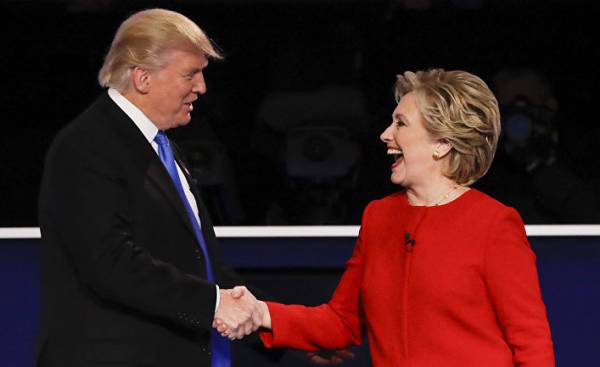
In two recent interviews President Donald trump said that President Vladimir Putin would prefer that the US President was Hillary Clinton. Even if he is right, it is not the reason that named the trump.
Trump said that during his election campaign he spoke of “strong army, strong boundaries and low oil prices”, contrary to the order of Putin:
Look what I did. The price of oil went down. We supply liquefied natural gas to Poland, significant shipments to Poland. Putin doesn’t want that. We also added $ 56 billion on purchases of military equipment in the last budget. None of this even could not think. Putin just doesn’t want it, so why should he support me?
Under President Clinton, according to trump, the American army had been “destroyed,” but oil prices would have been higher:
We will be exporting energy, and it is not necessary. He would have preferred Hillary, she would put the windmills. He would have liked it more, because it would increase energy prices, and Russia, as you know, very dependent on them.
Based on these two arguments, rather it is easy to imagine that Putin would really prefer to see Clinton in the White house. They testify against trump.
In contrast to candidate Trump candidate Clinton was not interested in expanding the size and Arsenal of the American army, preferring to speak about modernization. But Putin is no matter whether the number exceeds the regular army of the United States half a million or not and will the us Navy new ships. Even during the cold war, when the Soviet Union was a much larger state in comparison with modern Russia, he could not match the US size of the military budget. Today, the number of U.S. army far exceeds the number of the army of Russia, and if to it to add an army of allies in NATO, Russia is, frankly, will remain far behind. However, this means almost nothing, because the giant nuclear arsenals of the USA and Russia keep them from being able to unleash a full-scale war, and for local or indirect collisions the numerical superiority does not matter.
Russia and the USA took different sides in the Syrian conflict. In Syria, the trump does almost the same thing I was going to do Clinton to break the Islamic state (a terrorist organization banned in Russia — approx. ed.). He increased the intensity of the air campaign and increased support for insurgents opposed to the regime of Syrian President Bashar al-Assad. He also held several strikes on Assad’s forces allegedly to prevent them to use chemical weapons or attack U.S. allies, but also possibly to ensure that U.S.-backed forces will have to fight for those areas that they liberate from ISIS. President Barack Obama refrained from such aggressive steps, but Clinton, who positioned himself as a hawk on Syria, most likely, would behave almost as well. Many feared that she could be much more resolute to insist on Assad’s departure — she called his departure “number one priority” — and, if it did, Putin is unlikely to want to see her in the White house because he still supports Assad.
As for energy, President Clinton would be the same or even a greater obstacle for Putin. She received generous donations from oil and gas companies, and she never showed a fundamental disagreement with the export of American gas and oil. In 1996, President bill Clinton put an end to the 26-year-old ban on the export of oil produced at the oilfields of Alaska. Hillary Clinton spoke out against Republican attempts to remove the total ban on exports, but only because, in its view, the government had to achieve certain concessions from the oil industry in exchange for the lifting of the ban.
Her plans to promote clean energy would increase the volume of American fossil fuels available for export, which could lead to lower world prices. In addition, as Secretary of state, Clinton called for the diversification of energy supplies to Europe, which is a traditional market for Russia, promoting the interests of the American company Westinghouse, working in the field of nuclear energy, as well as various projects of American oil and gas companies. If Clinton became President, it is unlikely to contribute to the implementation of Russia’s interests in the energy field.
Congressional Democrats currently support the bill, according to which sanctions against Russia are expanding and under their action get construction projects of pipelines. If the President was Clinton, most likely, she would insist on exactly the same measures in response to what she considered an attempt of Russia to seek its defeat in the presidential election.
The answer to the question about how would prefer Putin to see Clinton as President depends on more esoteric reasons and almost nothing to do with the answer to the question of how she was ready to carry out the traditional policy of the United States in the field of defense and energy, which is always contrary to the interests of the Kremlin and to the Kremlin have long been adapted.
A much more important question is, whether Putin prefers chaos, unpredictability and the amateurism of the administration trump the predictable, mundane formulas and clichés that Clinton had proposed during the election campaign and which she likely would, as President. Distrust of Putin to the US is very deep. No American leader will not be able to change that. Putin said many times that he is willing to work with any American President, bearing in mind that these relations will always be extremely difficult. But that would prefer Putin, the stability of the known, well-studied enemy or accidental achievements and losses?
Given the role played by the Russian propaganda machine during the election campaign in 2016, Putin was interested in short-term destabilization and mockery of American democracy. But he has shown no sign of his desire to achieve long-term instability in the United States. It is unclear how this could help the Kremlin, in addition, to distract attention from his covert maneuvers, such as, for example, the slow progress of the Russian border deep into Georgian territories occupied South Ossetia. But such attempts to distract attention can be costly. No one knows what can go tramp to piss of a distinguished TV presenter, or raise your declining rating. Meanwhile, an endless stream of scandals makes it too toxic to business relationships, as evidenced by the recent decision of the administration to trump to deny the use of the products of Kaspersky in the Federal agencies.
At some point, even to mock the panic of the American elite — the representatives of Putin’s inner circle for a long time was engaged in it — can become meaningless and boring. If Putin has learned some lesson from the events that followed the election trump, so the lesson is that he will not be able to establish relations with the United States, because American institutions will always treat him with hostility.

